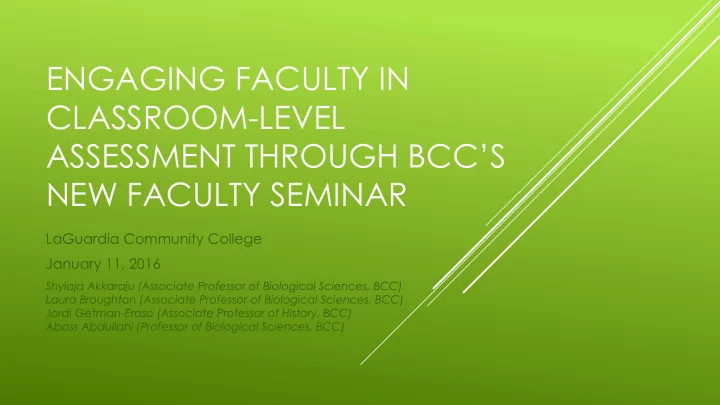

ENGAGING FACULTY IN CLASSROOM-LEVEL ASSESSMENT THROUGH BCC’S NEW FACULTY SEMINAR LaGuardia Community College January 11, 2016 Shylaja Akkaraju (Associate Professor of Biological Sciences, BCC) Laura Broughton (Associate Professor of Biological Sciences, BCC) Jordi Getman-Eraso (Associate Professor of History, BCC) Abass Abdullahi (Professor of Biological Sciences, BCC)
Semester milestones : important deadlines and activities Career Planning: expectations, responsibilities, and planning Pedagogy: successful BCC strategies and the teaching eportfolio Assessment: Classroom Assessment Projects (CAP) Building community : forming and strengthening relationships with colleagues NEW FACULTY SEMINAR STRUCTURE
Technology Faculty Mentors New Faculty Mentors • Shyla Akkaraju • Mark Lennerton • BCC full-time 2014-25: (2014-15) faculty • Albert Robinson 25 participants members • Abass Abdullahi • Delwar Sayeed starting in Fall of (2015-16) 2015-16: the stated year 16 participants • Laura Broughton • Jordi Getman- Eraso NEW FACULTY SEMINAR PARTICIPANTS
Fall January Spring • Four 3-hour • 3-day • Four 3-hour workshops workshop workshops (one each • 3 hours month) reassigned time NEW FACULTY SEMINAR TIMELINE
Fall January Spring • Attendance • Attendance • Attendance • Short • Reappointment • Career Plan assignments, Papers • Teaching including ePortfolio reflections as • Classroom blog posts and Assessment readings Project NEW FACULTY SEMINAR BENCHMARKS
Analytical Skills from one’s discipline can be applied to a faculty member’s development as an educator Research, data collection and analysis, synthesis, presentation and publication work as well for assessment as they do for discipline-specific research Properly conducted assessment can lead to both Improved teaching and learning, and Publications for career advancement FACULTY ARE PRIMARILY TRAINED AS ACADEMICS IN THEIR DISCIPLINES
Classroom Assessment Projects (CAPs) are essential and significant products created by participants in BCC’s New Faculty Seminar (NFS) Faculty work individually or in pairs to create and implement small, 1- semester projects that assess an aspect of one of their courses CAPs are tied to the student learning outcomes of the course CAPs are rooted in a firm theoretical pedagogical foundation CAPs are documented through Poster presentations at the spring BCC Faculty Day Reports posted in the faculty’s individual Teaching eportfolios THE CLASSROOM ASSESSMENT PROJECTS (CAPS)
The Assessment Concepts: The Pedagogical Concepts: Empathy Demographics of the student body Writing to learn Providing structure; scaffolding Teaching philosophy Experiential learning The SMART framework Communicating using images Creating student learning outcomes Threshold concepts (SLOs) Metacognition Assessment vehicles (exams, essays, oral Flipping the classroom presentations, performances, projects) Documenting teaching and learning Assessment tools (scantrons and rubrics), in particular creating and using rubrics CAP FOUNDATION: TOPICS ADDRESSED BEFORE FACULTY CREATE CAPS
Fall January Spring • Formulate projects: • Implement CAP • Intro to pedagogy and assessment • Create SLOs • If necessary, get IRB approval • Create teaching • Pick assessment philosophy vehicle • Collect data • Start IRB • Pick assessment • Analyze data certification tool • Present CAP at • Set benchmarks Faculty Day • Create project • Write CAP report on implementation Teaching eportfolio plan CAP TIMELINE
PLANNING CLASSROOM ASSESSMENT PROJECT (CAP) 1. Identify the Problem 2. Write a list of SLOs 3. Formulate a Strategy to address the Problem 4. Specify the assessment vehicle (e.g. assignment) and tool (e.g. Rubric) 5. Specify the benchmarks for student performance
IMPLEMENTING CLASSROOM ASSESSMENT PROJECT (CAP) 1. Explain project to students (if necessary) 2. Give assignment and explain rubric 3. Collect data 4. Assess samples using rubric 5. Evaluate results and impact on student success – were benchmarks met? 6. Closing the loop – what are you going to do about it?
EXAMPLES OF CAPS FROM 2014-15
https://bcc- cuny.digication.com/stacia_reader_edd_mph/coursework https://bcc-cuny.digication.com/Lysniak/CAP Problem: Students don’t easily understand the cardiovascular system Strategy : Use of a walk-through to learn the cardiovascular system in 3 health and physical education classes: PEA 11, PEA 15, HLT 91 Conclusions: Students who participated in the walkthrough showed increased understanding of the circulatory system over those who did not This CAP lead to a grant proposal in Fall 2015 that seeks to spread the use of the walkthrough to more courses, including Biology SYSTEMATIC AND PULMONARY CIRCULATION LESSON FOR COMMUNITY COLLEGE STUDENTS ULANA LYSNIAK, ED.D. & STACIA READER, ED.D.
Recommend
More recommend